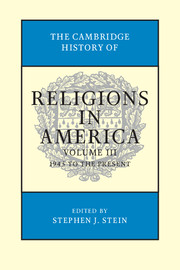Book contents
- Frontmatter
- SECTION I THE POSTWAR RELIGIOUS WORLD, 1945 AND FOLLOWING
- SECTION II CONTROVERSIAL ISSUES IN TRANSITIONAL TIMES
- 7 Secularization in American Society: A Review of the 1960s
- 8 Breaking Silence: Churches and Opposition to the Vietnam
- 9 The Religious Significance and Legacy of the Civil Rights Movement, 1950–1970
- 10 The Kennedy Election: The Church-State Question and Its Legacy
- 11 “Love is the Only Norm”: The New Morality and the Sexual Revolution
- 12 Second Vatican Council
- 13 The State of Israel
- SECTION III THE WORLD’s RELIGIONS IN AMERICA
- SECTION IV RELIGIOUS AND CULTURAL CONFLICT IN AMERICA
- SECTION V NEW AND CONTINUING RELIGIOUS REALITIES IN AMERICA
- SECTION VI CONCLUDING ESSAYS
- Index
- References
7 - Secularization in American Society: A Review of the 1960s
from SECTION II - CONTROVERSIAL ISSUES IN TRANSITIONAL TIMES
Published online by Cambridge University Press: 28 July 2012
- Frontmatter
- SECTION I THE POSTWAR RELIGIOUS WORLD, 1945 AND FOLLOWING
- SECTION II CONTROVERSIAL ISSUES IN TRANSITIONAL TIMES
- 7 Secularization in American Society: A Review of the 1960s
- 8 Breaking Silence: Churches and Opposition to the Vietnam
- 9 The Religious Significance and Legacy of the Civil Rights Movement, 1950–1970
- 10 The Kennedy Election: The Church-State Question and Its Legacy
- 11 “Love is the Only Norm”: The New Morality and the Sexual Revolution
- 12 Second Vatican Council
- 13 The State of Israel
- SECTION III THE WORLD’s RELIGIONS IN AMERICA
- SECTION IV RELIGIOUS AND CULTURAL CONFLICT IN AMERICA
- SECTION V NEW AND CONTINUING RELIGIOUS REALITIES IN AMERICA
- SECTION VI CONCLUDING ESSAYS
- Index
- References
Summary
Over the last fifty years there have been a few major changes in the ways in which Americans experience their relationship to the nation as a whole, to the sacred, and to the passage of time. Together, these changes reflect aspects of the process of secularization in complex modern societies. In this essay I will argue that secularizing societies and, in particular, American society from the 1960s forward have become permeated with temporality by the increasing differentiation of the sacred from religion and by a sense of chronic crisis.
I will also argue that the assassinations of John F. Kennedy, his brother Robert, and Martin Luther King, Jr., drove the sacred from places closest to the cultural center and into more immediate, accessible, local, and particular contexts. Martin E. Marty noted of the Kennedy brothers and of King that after “their declines and deaths” there was “a change of religious experiences in a new, centrifugal direction.” Marty went on to note that as Catholics became more divided under the reactionary leadership of Pope Paul VI, “presidential religious symbols … were seen in an almost wholly negative light,” and African Americans became increasingly polarized between separatists and more conservative and liberal constituencies. Kennedy had stood between Americans and the abyss of nuclear war. King stood between Americans and the abyss of violent racial conflict. Their deaths opened the doors to terror wider than ever before.
- Type
- Chapter
- Information
- The Cambridge History of Religions in America , pp. 149 - 169Publisher: Cambridge University PressPrint publication year: 2009

